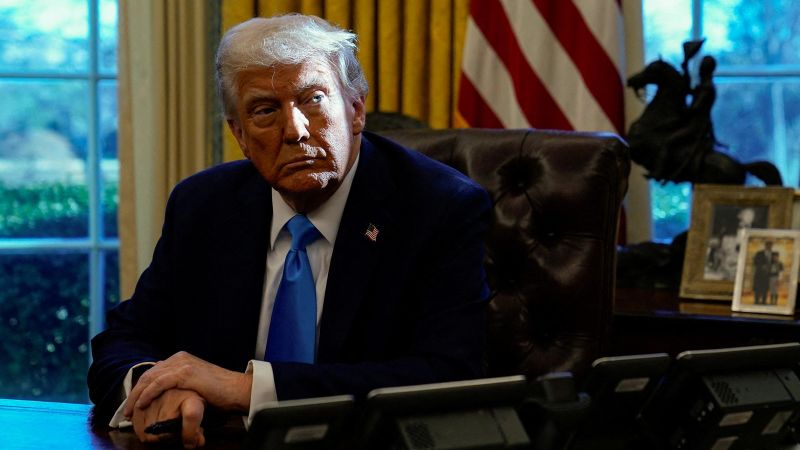
CNN
—
We know that President Donald Trump likes to keep world leaders questioning his sanity because he admitted it back in October.
Asked by The Wall Street Journal’s editorial board if he would ever use military force to defend Taiwan from China, Trump dismissed the question.
“I wouldn’t have to, because he respects me and he knows I’m f***ing crazy,” Trump said, referring to Chinese President Xi Jinping, according to the Journal.
It’s hard not to view his shocking proposal for the Gaza Strip through the lens of the “crazy” bravado Trump is banking on. Trump suggested Tuesday night that the US “own” and occupy the Gaza Strip, relocate Palestinians to a “beautiful” place somewhere and create the “Middle Eastern Riviera,” perhaps with US troops.
Trump’s idea is for the US to take on a gargantuan responsibility: It would include pacifying one of the most combustible regions in the world, forcibly remove up to 2 million people — many of whom don’t want to leave — and finding a country to put them in. All of the regional players, except Israel, have already rejected the idea, although it will certainly be a topic of conversation when the King of Jordan visits the White House next week.
Many of those who heard Trump’s idea immediately thought: “Is this guy crazy?” And maybe that’s the point.
Trump admits to a little craziness in foreign affairs, but the more technical term is the “madman theory” of foreign policy, coined in reference to President Richard Nixon, who wanted North Vietnam to believe he might use nuclear weapons. It’s hard to determine whether this kind of brinksmanship works, however.
Rather than unhinged, Trump seemed very deliberate Tuesday night when he caught the world and the Middle East off guard. It was more “Modest Proposal” than “The Madness of King George.” He was reading from a piece of paper when he made the comments, so we know they were intentional. He went on at length during the news conference with Israeli Prime Minister Benjamin Netanyahu, with seeming sincerity.
CNN’s White House team reported Wednesday that the idea apparently originated with Trump himself, according to people familiar with the matter, and that it developed over time after he saw images of destruction in Gaza.
You could easily apply Trump’s embrace — perhaps deliberate, perhaps accidental — of the “madman theory” to any number of his foreign policy ideas, including from this past week.
Punitive tariffs on Mexico and Canada? Really? Or was the threat of those tariffs just a precursor to trade talks and a marker that he’s serious? The tariffs, for the record, were not applied to Mexico and Canada, at least not for a month, after those countries offered tepid concessions, and the trade war with China is so far relatively muted.
CNN’s Jim Sciutto wrote a book, “The Madman Theory: Trump Takes on the World,” about how Trump arguably employed his unpredictability during his first term, notably during his negotiations with North Korean leader Kim Jong Un or his efforts to threaten NATO members. At that time, his advisers actively tried to work against some of his foreign policy ideas, according to Sciutto’s reporting.
“Trump’s ‘madman’ has been intended for audiences abroad and at home,” Sciutto wrote. “He wants to convince Americans as much as foreigners that he’s tough. And that perceived toughness is, to him, an end itself, often in spite of damage his approach has done to alliances, or even to the stated goals of Trump’s own foreign policy.”
Spinning Trump’s proposals
If this is an application of the “madman” persona, Trump’s aides have been left to try to apply some sanity.
White House press secretary Karoline Leavitt explained Trump’s idea very differently than her boss during an appearance at the White House on Wednesday.
“I can confirm that the president is committed to rebuilding Gaza and to temporarily relocating those who are there because, as I’ve showed you repeatedly, it is a demolition site,” she said.
Trump very directly said he wouldn’t rule out putting American troops into the effort, but to Leavitt, that means he hasn’t committed to it, either.
A reporter noted that Trump was elected pushing an “America First” foreign policy, criticizing foreign entanglements and the use of American troops in the Middle East, so the proposal to “own” Gaza seems like a reversal. But Leavitt disagreed.
“I would reject the premise of your question that this forces the United States to be entangled in conflicts abroad,” she said.
In her view, Americans elected Trump for “out of the box” ideas like this one.
Despite Trump’s comments refusing to rule out troops and his use of the term “own” for Gaza, she said this of Trump’s proposal:
“That does not mean boots on the ground in Gaza. It does not mean American taxpayers will be funding this effort. It means Donald Trump, who is the best dealmaker on the planet, is going to strike a deal with our partners in the region,” she said.
It would have commanded much less attention if Trump had just said he’d like Egypt and Jordan to accept Palestinian refugees, perhaps on a short-term basis.
Trump stood by his “plan” on Truth Social Thursday morning, but he also suggested that “no soldiers by the US would be needed!”
In Rubio’s view, Trump “very generously” offered not to buy or own Gaza, but to do things like “help with debris removal, help with munitions removal, help with reconstruction, the rebuilding of homes and business and things of this nature so that then people can move back in. But in the meantime, they’ll have to live somewhere.”
That sounds more reasonable, but it’s not what Trump said. Then again, who’s to say what, exactly, he meant or what he’ll end up doing?


